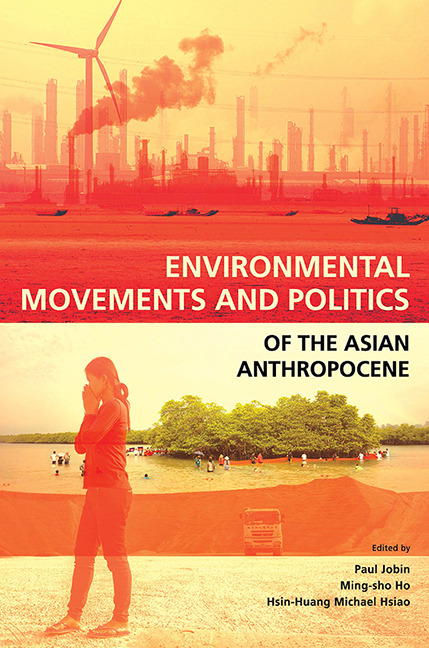Book contents
- Frontmatter
- Contents
- List of Tables, Maps and Figures
- Acknowledgements
- About the Contributors
- 1 Environmental Movements and Politics of the Asian Anthropocene: An Introduction
- 2 Environmental Movements in Taiwan’s Anthropocene: A Civic Eco-Nationalism
- 3 Environmental Movements in Post-handover Hong Kong: Between Managerialism and Radicalism
- 4 The Post-politics of Environmental Engagement in Singapore
- 5 Environmental Movements in the Philippines: Contestation for Justice in the Anthropocene
- 6 Environmental NGOs in “Post-New Order” Indonesia: Saving the Forests Through Democracy
- 7 Environmental Activism in Malaysia: Struggling for Justice from Indigenous Lands to Parliamentary Seats
- 8 State, NGOs, and Villagers: How the Thai Environmental Movement Fell Silent
- 9 Environmental Movements in Vietnam under One-Party Rule
- 10 The Cambodian Neopatrimonial State, Chinese Investments, and Anti-dam Movements
- 11 Conclusion: Environmental Movements and Political Regimes, or Why Democracy Still Matters in the Anthropocene
- Index
9 - Environmental Movements in Vietnam under One-Party Rule
Published online by Cambridge University Press: 08 October 2021
- Frontmatter
- Contents
- List of Tables, Maps and Figures
- Acknowledgements
- About the Contributors
- 1 Environmental Movements and Politics of the Asian Anthropocene: An Introduction
- 2 Environmental Movements in Taiwan’s Anthropocene: A Civic Eco-Nationalism
- 3 Environmental Movements in Post-handover Hong Kong: Between Managerialism and Radicalism
- 4 The Post-politics of Environmental Engagement in Singapore
- 5 Environmental Movements in the Philippines: Contestation for Justice in the Anthropocene
- 6 Environmental NGOs in “Post-New Order” Indonesia: Saving the Forests Through Democracy
- 7 Environmental Activism in Malaysia: Struggling for Justice from Indigenous Lands to Parliamentary Seats
- 8 State, NGOs, and Villagers: How the Thai Environmental Movement Fell Silent
- 9 Environmental Movements in Vietnam under One-Party Rule
- 10 The Cambodian Neopatrimonial State, Chinese Investments, and Anti-dam Movements
- 11 Conclusion: Environmental Movements and Political Regimes, or Why Democracy Still Matters in the Anthropocene
- Index
Summary
Environmental activism is a recent phenomenon in Vietnam and, considering the authoritarian nature of the regime, it is still uncertain whether sustained environmental movements might yet emerge. A movement is here defined according to Tarrow (1994, p. 6) as “people with common purposes and solidarity in sustained interaction with elites, opponents and authorities”, which distinguishes it from discrete instances of activism that do not challenge authority. This is the case in Vietnam, where campaigns are highly fragmented and generally do not last very long or have a deeper impact on the overall society. In order to thwart independent political association, the government has at first sought to engineer its own environmental movement with mass organizations and non-governmental organizations (NGOs) controlled by the government. This, however, has not been successful as the government and business interests are closely tied together. As such, the government has tolerated more independent activism in the form of NGOs, but they are not only required to register with the government but the institutional context forces them to remain small with insufficient financial resources. Moreover, rather than promoting grassroots environmental activism, they focus mostly on service delivery and policy advice. Even the formation of networks has not resolved this problem and may have instead reinforced it. Nevertheless, the government has encouraged environmental activism. There has been a rise in protests against serious pollution, which have generally been tolerated. The government-owned media has reported extensively about them. However, this changed in 2016 when the government heavily repressed nationwide protests in response to massive fish deaths caused by the Taiwanese-owned Formosa Ha Tinh Steel plant. The government's response to this protest movement reveals that, despite recent progress, a widespread environmental movement is unlikely to emerge.
This chapter will explore the progress and challenges of Vietnam's environmental activism. In the context of potential repression and deep fragmentation, traces of environmental movements can be found, but there are severe restrictions under the authoritarian one-party state. By examining the opportunities and obstacles of the various actors in this field, it is possible to map the changing situation in Vietnam and draw attention to both the opportunities and obstacles on the path toward a broad-based environmental movement. First, the chapter seeks to demonstrate that the Vietnamese government has effectively weakened the organizational basis of society for any sustained environmental movement to emerge.
- Type
- Chapter
- Information
- Environmental Movements and Politics of the Asian Anthropocene , pp. 261 - 294Publisher: ISEAS–Yusof Ishak InstitutePrint publication year: 2021



